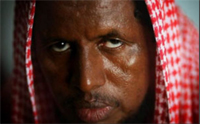Two commanders of the al Qaeda-backed As Shabaab were killed during heavy fighting with a government-supported Islamist militia in central Somalia.
Shabaab leaders Mohamed Mohamed Salad and Mohamed Yusuf Nur were “martyred” in the town of Guriel during clashes with the pro-government Ahlu Sunna Waljamaa, Shabaab spokesman Sheikh Mukhtar Robow Abu Mansour told the media. More than 30 Somalis were killed and more than 50 were wounded during the latest round of fighting in the contested central Somali town.
The fighting between Shabaab and Ahlu Sunna began in late December after Ahlu Sunna attacked Shabaab in three towns in the central Somali province of Galgadud. Forty Somalis were killed during three days of fighting that resulted in the ouster of Shabaab forces from the town of Guriel.
Shabaab, or the Somali Youth Movement, has gained considerable ground in southern and central Somalia after heavy fighting during 2008. More than 16,000 Somalis were killed last year. Late last summer, Kismayo, Somalia’s second largest city, fell to Shabaab. The fighting left the powerless Transitional Federal Government in control over the town of Baidoa and in small pockets in the capital of Mogadishu.
Shabaab was formed shortly after the Ethiopians invaded Somalia and ejected the Islamic Courts Union from power in late 2006. Many of Shabaab’s senior leaders trained in al Qaeda camps and are considered al Qaeda leaders. Senior Shabaab leader Saleh Ali Saleh Nabhan is wanted by the U.S. Government for his involvement in the 1998 African embassy attacks and 2002 Mombasa attacks. In September 2008 Nabhan formally reached out to al Qaeda’s central leadership to formally join the group.
The fighting between Shabaab and Ahlu Sunna is taking place as the Ethiopian Army is withdrawing from the capital of Mogadishu and other Somali regions. Six of Ethiopia’s 14 bases in Mogadishu have been vacated.
|
|
|
Sheikh Yusuf Indha’adde. |
Islamist militias allied with the Ethiopian faction of the Alliance for Re-libration of Somalia (ARS), led by al Qaeda leader Hassan Dahir Aweys, the former chief of the Islamic Courts, have taken control of the Ethiopian bases. Forces under the command of Sheikh Yusuf Indha’adde, the former defense minister of the Islamic Courts, have also attacked Ethiopian forces as they withdrew from Mogadishu.
The Eritrean faction of the ARS opposes the Djibouti peace accords, an agreement that calls for power-sharing between the Islamist militias and the government, Daveed Gartenstein-Ross, the director of the Foundation for the Defense of Democracy’s Center for Terrorism Research told The Long War Journal.
Sheikh Sharif Sheikh Ahmed, the former political leader of the Islamic Courts, leads what is called the Djibouti faction of the ARS. Sharif and Aweys have publicly clashed over their disagreement over the peace talks. Aweys claimed he took control of the ARS in July. In August, Aweys said his forces would attack UN peacekeepers and Ethiopian forces would be “expelled from the country.”
Shabaab has also vowed to attack the remaining 3,000 African Union peacekeepers as well as target Ethiopian forces as they leave the country. “We will strike AMISOM (African Union Mission to Somalia) bases like the airport and K4,” Abu Mansour said today.









8 Comments
al-shabab is experiencing difficulties with this new moderate islamic group
said it before:
old somali saying,
what do you get when you put two somalis together?
-an argument. 3? -a fight. 4? -a riot.
gonna get interesting in the horn of africa…
[Libertyship46: Deleted for violating the comments policy.]
Al Shabab won’t be compromising with its rivals nor is it likely that those rivals will be able to stand up to al Shabab, long term. Normally, one might expect the situation to settle into some sort of stalemate after a period of conflict between the rival groups. Al Shabab has allied itself with Al Quada’s agenda though, and there will be no settling of this conflict. Al Shabab will be supported from the outside until they overcome their rivals. If they are not aggressive enough they will be pushed from the outside. If they are not competent enough, their leadership will be augmented from the outside. If they are not up to the task of completely taking over Southern Somalia, their leadership will be replaced, or the entire group replaced.
Gradually al Shabab will vanquish it’s rivals and consolidate it’s position in Southern Somalia. It may only take a couple of years for them to be in a position to threaten the Ethiopian border, once again.
The invasion of Somalia by US supported Ethiopian force tied down Somali extremists for two years. Any hope of anything long term was always doomed by the fact that the Ethiopian force was no where near strong enough to control Mogadishu. If al Shabab takes two more years to consolidate, than the situation will be right back where it started with regard to cross boarder attacks into Ethiopia.
This started as a very bad situation. If we had been told we could buy ourselves four years, at relatively little cost to ourselves, we would have taken it. For those who whine that nothing constructive has been accomplished, there never was any real possibility of peace, nor any sort of permanent gains to be had. The alternative to this whole situation would have been to fight defensive battles within Ethiopia’s eastern Ogaden region and northern Somalia against an Islamist Somali insurgency.
What is actually known about this Ahlu Sunna Waljamaa? Any idea how they compare to Shabaab in terms of ideology and fighting strength?
Well…here’s to a long, bloody, deadly fight.
Let’s pray that they both lose.
Ahl Sunnah wal-Jamma is not actually an Islamist group, and the militia in question is allied to the government and are the militia of a warlord from Dusamareeb.
They are not actually part of Ahl Sunnah wal-Jamma, and that civil society organization has actually requested that they stop calling themselves that.